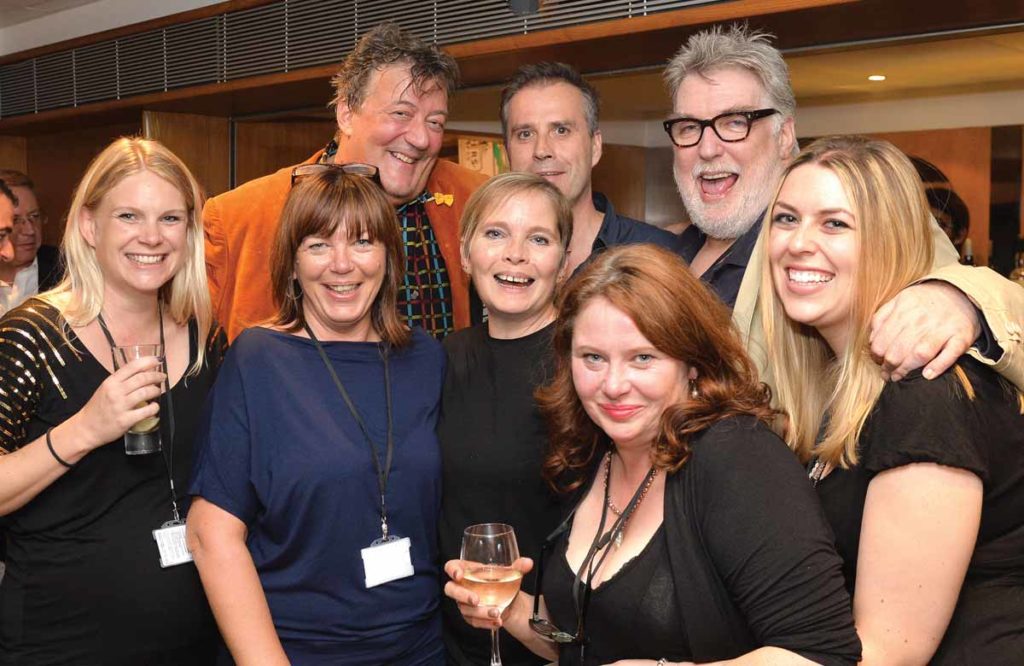David Johnson Obituary
Producer and promoter who worked across comedy and theatre, bringing some of the biggest names to the Edinburgh Fringe throughout the 1990s
The producer David Johnson was a larger-than-life figure whose dominance of the Edinburgh Festival Fringe in the 1990s catapulted a generation of young comedians to fame and helped to raise the profile of new provocative playwrights to lend, as The Stage noted, “the theatre industry a taste of Cool Britannia”.
An impresario with an unerring nose for talent, among the then young unknowns he championed were Graham Norton, Sue Perkins, playwright Mark Ravenhill and comedy trio Fascinating Aida, whose Dillie Keane described Johnson as being “possessed of absolute theatrical nous and intellectual curiosity: a stalwart champion of the new, the marginal and the edgy, he loved performance that had the power to shock, but only so long as it was true”.
Johnson’s reputation for enthusiasm and generosity towards artists and venues was matched by his forthrightness in confronting any slight or injustice towards both. In 2014, he was involved in a public spat with the Ambassador Theatre Group over requests for complimentary tickets to Fascinating Aida’s Edinburgh Festival show that year.
Throwing down the gauntlet in an open letter, he attacked ATG’s “Easyjet/Ryanair mentality” towards the incidental costs it charged to touring shows and artists, pointedly adding: “My company [is] big and busty enough to tell you to pay your way in Edinburgh, or get bent.”
Born in Duffield, Derbyshire, after schooling in Harrow he studied at the London School of Economics before working for Laister Dickson as a publicist in the 1980s. His first foray into live entertainment was the Stephen Fry-led charity benefit Hysteria in aid of the Terrence Higgins Trust in 1987, after which he devoted more of his time to the stage and comedy club.
A chance encounter with producer Mark Goucher, who remembers him as “a giant of our business”, during the 1991 Edinburgh Fringe, led to the pair launching G&J Productions the following year. Its meteoric rise to prominence was as sudden and swift as its collapse in 1998 following a rapid expansion that stretched resources to breaking point.
Taking virtual residence in Edinburgh throughout the decade, the pair’s portfolio of comedians read like a who’s who of emerging talent, the likes of Steve Coogan, Greg Proops, Rhona Cameron and Jackie Clune among them.
If Johnson’s eclectic theatrical tastes shared any qualities, chief among them was a bold, provocative directness, a refusal to distinguish between ‘high’ and ‘low’ art and an ability to delight audiences while often simultaneously shocking them.
At a time when regional theatre and the West End seemed to be creatively treading water, Johnson breathed energetic new life into both to attract new and noticeably younger audiences to a roster of shows that saw him bring Steven Berkoff’s Sturm und Drang and Nick Hornby’s Fever Pitch to the Arts Theatre within months of each other, and take Mark Ravenhill’s Shopping and Fucking into the Queen’s Theatre and Irvine Welsh’s Trainspotting into the Ambassadors and on to New York.

David Johnson with Stephen Fry, John Mackay and production/publishing team members Katya Shipster, Sharon Burgess, Ali Day, Sally Homer and Kimberley Atkins at the Royal Festival Hall in 2014. Photo: Steve Ullathorne
America was also a source of talent, with Johnson notably bringing the cult comedian Bill Hicks to the UK and satirist Michael Moore to Britain for the first time, although his most successful import was the Reduced Shakespeare Company. In the second half of the 1990s, it seemed to be perpetually touring or lodged in West End runs. In 1997, Johnson had three of the comedy troupe’s shows – its abridged versions of the Complete Works of William Shakespeare, the Bible and the Complete History of America – simultaneously in residence in Theatreland.
The same year, the pair won The Stage award for special achievement in regional theatre and in 1998 made an appearance in the annual The Stage 100.
After G&J Productions collapsed, Johnson briefly teamed with producer Richard Temple, with whom he took Catherine Johnson’s pre-Mamma Mia! jukebox musical Shang-a-Lang on tour. Other hits included the Australian troupe Puppetry of the Penis at the Whitehall Theatre and the cult hit Sing-A-Long-A Sound of Music at London’s Prince Charles Cinema.
The success of both shows confounded sceptics and underlined Johnson’s ability “to see the spark of an idea and know how to make it work”, according to producer John Mackay, with whom he formed Password Productions in 2008 with the aim of producing “top-notch theatre, cabaret, comedy and spoken-word events”.
Maintaining his presence in comedy and theatre, Johnson promoted solo shows, tours, book launches and West End runs for luminaries such as Fry, Sandi Toksvig, Perkins, Alexei Sayle and Stewart Lee, who recalls: “David was unlike any live promoter I had encountered – transparent and honest and loved… a combination of George Melly, Withnail’s Uncle Monty and Paddington Bear.”
Johnson secured a Fringe First award for Ravenhill and Conor Mitchell’s Ten Plagues, starring Marc Almond, in 2011, took cabaret into anarchic territory with David Hoyle and Richard Thomas’ Merrie Hell (Soho Theatre, 2012) and tapped into younger audiences as co-producer of the national tour and London run of CBBC hit In the Night Garden Live.
After a year of Covid-cancelled shows, at the time of his death he had been putting final details together for tours by Fascinating Aida, Toksvig and Lee for 2021.
An associate of the Soho Theatre, he was also a trustee of Edinburgh’s Pleasance Theatre, scene of several triumphs over the years.
David Johnson was born on October 12, 1960, and died suddenly on December 13, aged 60. He is survived by his mother, Sandy, and sisters, Deborah and Sarah.
